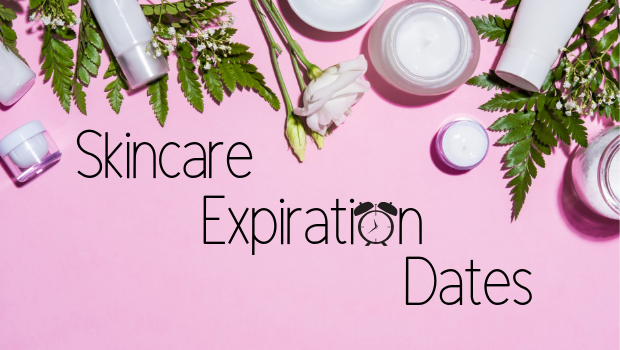Determining the Shelf-Life of Skincare Products

When you clean your fridge, you can tell within seconds what has gone bad. Vegetables start to dry up and shrink, while prepared meals start to change color. Milk looks curdled and you can see slight discoloration too. But, have you ever thought about how to tell when your skincare products go bad? We gotta admit, it’s not easy to know when it’s time to replace your favorite foundation or moisturizer. Using an expired product is not only gross - it can be harmful to your skin and health!
Why you need to check for expired products
In humid environments like your bathroom, products tend to attract bacteria. If old products aren’t thrown out, they will become contaminated with bacteria which will, in turn, irritate the skin, causing skin discoloration, rashes, and infections.
 Sadly, not all skin products contain labels with an expiration date. Even if they do, some products tend to go bad earlier because of the heat. Some Korean products print their manufacturing dates on the products to help customers know how fresh their products are. This is why knowing the estimated shelf life of a product is always important. Over-the-counter or OTC products such as sunscreens and acne medications follow a strict expiration date. If you see that they are still sitting in your bathroom cabinet past the expiration date, toss them out immediately. No exceptions. When a skincare product expires, the active ingredients in it become ineffective. For example, if a sunscreen is used once it has gone bad, your skin will be prone to premature aging, hyperpigmentation, dehydration, and skin cancer from unprotected sun exposure. However, some skin-care products such as cleansers or moisturizers, if stored properly, might still be effective after their expiration date. Always make sure to read the label!
Sadly, not all skin products contain labels with an expiration date. Even if they do, some products tend to go bad earlier because of the heat. Some Korean products print their manufacturing dates on the products to help customers know how fresh their products are. This is why knowing the estimated shelf life of a product is always important. Over-the-counter or OTC products such as sunscreens and acne medications follow a strict expiration date. If you see that they are still sitting in your bathroom cabinet past the expiration date, toss them out immediately. No exceptions. When a skincare product expires, the active ingredients in it become ineffective. For example, if a sunscreen is used once it has gone bad, your skin will be prone to premature aging, hyperpigmentation, dehydration, and skin cancer from unprotected sun exposure. However, some skin-care products such as cleansers or moisturizers, if stored properly, might still be effective after their expiration date. Always make sure to read the label!
How to check the product
Rule # 1: If a product looks or feels different than the first time you used it, throw it in the trash.

Before the application of a product, make sure to notice its texture, color, smell, and consistency. This is the best time to make use of your senses. If something feels off, its best to trust your instinct and throw the product away. For example, when an oil-based product expires, it starts to smell. This is because of the chemical bonds that are affected by oxidation and light. You’ll notice that bad oils have a sickly plastic-chemical smell. Vitamin C, on the other hand, tends to change color once it has been exposed to open air. If you leave a bit of sunscreen that contains Vitamin C around the edges of a product, it might turn into a brownish-yellow color.
How to increase the shelf-life of your skincare product
For starters, unopened products last longer than opened ones. So, if an unopened skincare product is lying in your cosmetic cabinet for a while, chances are that it hasn’t gone bad. Opened products, however, tend to get contaminated as they attract bacteria, especially in humid environments. Always remember to make note of when you have opened a product as once you break the seal, the clock in the product’s shelf life starts to tick.
To lessen the risk of contamination of a product:
- Thoroughly wash your hands before and after using any product.
- Instead of using your fingers to scoop out the product inside a jar, use a small spatula. Even if you wash your hands before the application of a product, some lingering germs will always get transferred into the jar. Other products come with a pump that keeps the bacteria out. However, remember to wash the spatula after every use to avoid contamination.
- Store your products in a dry environment so that they are not affected by the heat of the shower or by the excess cold. Climate, humidity, and temperature changes tend to shorten the life of a product.
- Make sure to tightly cap the product after using it. Air exposure tends to make the product go bad faster, oxidizing it, and making it harmful for the skin.
- Ladies, we’ve all grown up learning that sharing is caring. However, when it comes to skincare products, make sure to not share them with anyone else. Germs travel faster than you can imagine.
- Sometimes, products dry up faster than we’d want them to. Don’t add water or saliva in order to remoisten or thin out those products.
- Use soap, water, or drying alcohol to clean your beauty sponges and brushes.
Cheatsheet for when to get rid of products

Skin and hair products:
- Moisturizers, face creams, and eye creams: 6 months to 1 year.
- Sunscreen: 1 year.
- Anti-aging and anti-acne products: Up to 1 year. However, anti-acne products containing Benzoyl peroxide need to be tossed out 3 months after they have been opened.
- Cleansers: 1 year.
- Toners: 6 months to 1 year.
- BHA or AHA exfoliants: 1 year.
- Lip balm: 1 year.
- Shampoos, conditioners, and hair styling products: 1 to 3 years opened, 3 years unopened.
Makeup:
- Mascara and liquid eyeliner: 3 to 6 months. If the product has dried up earlier, it’s time to toss it out! Never add water to make it last longer. In case of an eye infection, toss out products sooner.
- Liquid foundation and concealer: 6 months to 1 year.
- Power pressed cosmetics (eye shadows, compact, powder foundation): 2 to 3 years.
- Lipsticks and glosses: 2 to 3 years. Toss the products out sooner if you catch a cold!
- Eye and lip pencils: 3 to 5 years. In order to preserve them longer, sharpen the pencils before every use.
- Nail polish: 1 to 2 years. If it dries up sooner, toss it out.
To make your skincare products last longer, remember to not overuse them!
Follow this method to make sure you’re using exactly the right amount of product to maintain a healthy regime-

No matter what a label says, make sure to always use your instincts when it comes to skin-care products (or any situation in life, really). If you “feel” as if a product seems off, throw it out. It is always better to be safe than sorry!




Comments
sarah —
stillmans beauty has the most effective and safe beauty products which are the most safe to use and 0% harmfull. visit the site https://stillmansbeauty.com/